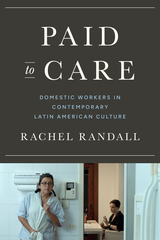6 books about Caribbean, English-speaking
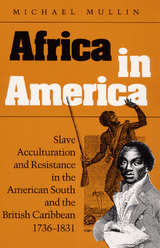
Africa in America
Slave Acculturation and Resistance in the American South and the British Caribbean, 1736-1831
Michael Mullin
University of Illinois Press, 1992
Extensive archival and anecdotal sources support Michael Mullin's description of slavery as it was practiced in tidewater Virginia, on the rice coast of the Carolinas, and in Jamaica and Barbados. Drawing upon case histories, Mullin offers new and definitive information about how African people met and often overcame the challenges and deprivations of their new lives through religion, family life, and economic strategies.
[more]
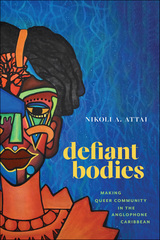
Defiant Bodies
Making Queer Community in the Anglophone Caribbean
Nikoli A. Attai
Rutgers University Press, 2023
In the Anglophone Caribbean, international queer human rights activists strategically located within and outside of the region have dominated interventions seeking to address issues affecting people across the region; a trend that is premised on an idea that the Caribbean is extremely homophobic and transphobic, resulting in violence and death for people who defy dominant sexual and gender boundaries. Human rights activists continue to utilize international financial and political resources to influence these interventions and the region’s engagement on issues of homophobia, transphobia, discrimination, and the HIV/AIDS epidemic. This focus, however, elides the deeply complex nature of queerness across different spaces and places, and fails to fully account for the nuances of queer sexual and gender politics and community making across the Caribbean. Defiant Bodies: Making Queer Community in the Anglophone Caribbean problematizes the neocolonial and homoimperial nature of queer human rights activism in in four Anglophone Caribbean nations -- Barbados, Guyana, Jamaica, and Trinidad and Tobago -- and thinks critically about the limits of human rights as a tool for seeking queer liberation. It also offers critical insight into the ways that queer people negotiate, resist, and disrupt homophobia, transphobia, and discrimination by mobilizing “on the ground” and creating transgressive communities within the region.
[more]
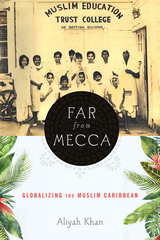
Far from Mecca
Globalizing the Muslim Caribbean
Aliyah Khan
Rutgers University Press, 2020
Honorable Mention, 2022 MLA Prize for a First Book
Far from Mecca: Globalizing the Muslim Caribbean is the first academic work on Muslims in the English-speaking Caribbean. Khan focuses on the fiction, poetry, and music of Islam in Guyana, Trinidad, and Jamaica. Combining archival research, ethnography, and literary analysis, Khan argues for a historical continuity of Afro- and Indo-Muslim presence and cultural production in the Caribbean. Case studies explored range from Arabic-language autobiographical and religious texts written by enslaved Sufi West Africans in nineteenth-century Jamaica, to early twentieth-century fictions of post-indenture South Asian Muslim indigeneity and El Dorado, to the attempted government coup in 1990 by the Jamaat al-Muslimeen in Trinidad, as well as the island’s calypso music, to contemporary judicial cases concerning Caribbean Muslims and global terrorism. Khan argues that the Caribbean Muslim subject, the “fullaman,” a performative identity that relies on gendering and racializing Islam, troubles discourses of creolization that are fundamental to postcolonial nationalisms in the Caribbean.
Far from Mecca: Globalizing the Muslim Caribbean is the first academic work on Muslims in the English-speaking Caribbean. Khan focuses on the fiction, poetry, and music of Islam in Guyana, Trinidad, and Jamaica. Combining archival research, ethnography, and literary analysis, Khan argues for a historical continuity of Afro- and Indo-Muslim presence and cultural production in the Caribbean. Case studies explored range from Arabic-language autobiographical and religious texts written by enslaved Sufi West Africans in nineteenth-century Jamaica, to early twentieth-century fictions of post-indenture South Asian Muslim indigeneity and El Dorado, to the attempted government coup in 1990 by the Jamaat al-Muslimeen in Trinidad, as well as the island’s calypso music, to contemporary judicial cases concerning Caribbean Muslims and global terrorism. Khan argues that the Caribbean Muslim subject, the “fullaman,” a performative identity that relies on gendering and racializing Islam, troubles discourses of creolization that are fundamental to postcolonial nationalisms in the Caribbean.
[more]

From Occupation to Independence
A History of the Peoples of the English-Speaking Caribbean Region
Richard Hart
Pluto Press, 1999
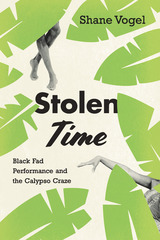
Stolen Time
Black Fad Performance and the Calypso Craze
Shane Vogel
University of Chicago Press, 2018
In 1956 Harry Belafonte’s Calypso became the first LP to sell more than a million copies. For a few fleeting months, calypso music was the top-selling genre in the US—it even threatened to supplant rock and roll. Stolen Time provides a vivid cultural history of this moment and outlines a new framework—black fad performance—for understanding race, performance, and mass culture in the twentieth century United States. Vogel situates the calypso craze within a cycle of cultural appropriation, including the ragtime craze of 1890s and the Negro vogue of the 1920s, that encapsulates the culture of the Jim Crow era. He follows the fad as it moves defiantly away from any attempt at authenticity and shamelessly embraces calypso kitsch. Although white calypso performers were indeed complicit in a kind of imperialist theft of Trinidadian music and dance, Vogel argues, black calypso craze performers enacted a different, and subtly subversive, kind of theft. They appropriated not Caribbean culture itself, but the US version of it—and in so doing, they mocked American notions of racial authenticity. From musical recordings, nightclub acts, and television broadcasts to Broadway musicals, film, and modern dance, he shows how performers seized the ephemeral opportunities of the fad to comment on black cultural history and even question the meaning of race itself.
[more]
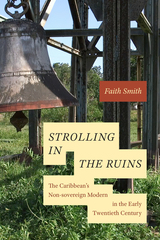
Strolling in the Ruins
The Caribbean's Non-sovereign Modern in the Early Twentieth Century
Faith Smith
Duke University Press, 2023
In Strolling in the Ruins Faith Smith engages with a period in the history of the Anglophone Caribbean often overlooked as nondescript, quiet, and embarrassingly pro-imperial within the larger narrative of Jamaican and Trinidadian nationalism. Between the 1865 Morant Bay Rebellion and World War I, British imperialism was taken for granted among both elites and ordinary people, while nationalist discourses would not begin to shape political imagination in the West Indies for decades. Smith argues that this moment, far from being uneventful, disrupts the inevitability of nationhood in the mid-twentieth century and anticipates the Caribbean’s present-day relationship to global power. Smith assembles and analyzes a diverse set of texts, from Carnival songs, poems, and novels to newspapers, photographs, and gardens, to examine theoretical and literary-historiographic questions concerning time and temporality, empire and diaspora, immigration and indigeneity, gender and the politics of desire, Africa’s place within Caribbeanist discourse, and the idea of the Caribbean itself. Closely examining these cultural expressions of apparent quiescence, Smith locates the quiet violence of colonial rule and the insistence of colonial subjects on making meaningful lives.
[more]
READERS
Browse our collection.
PUBLISHERS
See BiblioVault's publisher services.
STUDENT SERVICES
Files for college accessibility offices.
UChicago Accessibility Resources
home | accessibility | search | about | contact us
BiblioVault ® 2001 - 2024
The University of Chicago Press




